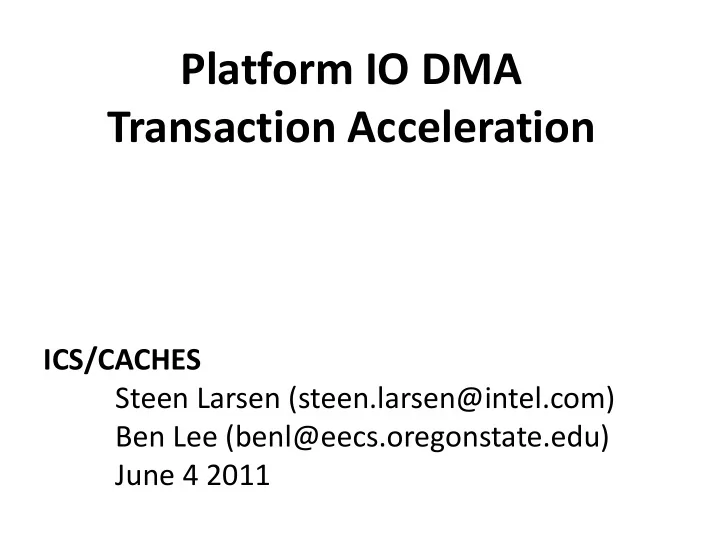

Platform IO DMA Transaction Acceleration ICS/CACHES Steen Larsen (steen.larsen@intel.com) Ben Lee (benl@eecs.oregonstate.edu) June 4 2011
Outline • Introduction & Motivation • Background • Proposal • Experiments & Analysis • Related & Future work
10,000 foot view of IO IO growth is not matching CPU and memory bandwidth growth. • Multi-core processors (CMP, SMT) • NUMA
Typical platform configuration and IO interface
Legacy TX
Legacy RX
Critical path latency (10GbE 64B)
IO transmit breakdown (10GbE 64B)
PCIe bandwidth utilization
Basic proposal claims Estimat Descri ed ptor Improv Factor Measurement unit DMA iDMA ement Comment/justification microseconds to send a TCP/IP message Descriptors are no longer Latency between two systems 8.8 7.38 16% latency critical Descriptors no longer Bandwidth- Gbps per serial lane consume chip-to-chip per-pin link 2.5 2.67 17% bandwidth
Proposed TX
Proposed RX
iDMA internals
Related work Sun Niagara2 Memory coherent IO
Estimated Descript Improvem Factor Measurement unit or DMA iDMA ent Comment/justification microseconds to send a TCP/IP message between two Descriptors are no longer Latency systems 8.8 7.38 16% latency critical Bandwidth- Descriptors no longer consume per-pin Gbps per serial lane link 2.5 2.67 17% chip-to-chip bandwidth Bandwidth scalability Not quantifiable Reduced silicon area and power Power Normalized core power Power reduction due to more efficiency (maximum) 100% 29% 71% efficient core allocation of IO Nanoseconds to control Round trip latency to queuing Quality of connection priority from control reduced from PCIe to service software perspective 600 50 92% system memory Silicon, power regulation and cooling cost reduction of Multiple IO multiple IO controllers into a complexity Die cost reduction 100% <50% >50% single iDMA instance Security na na na not quantifiable
Thank you! Questions?
Recommend
More recommend